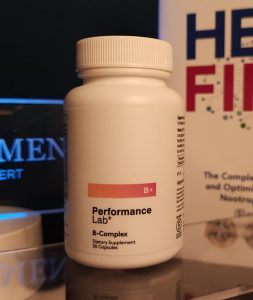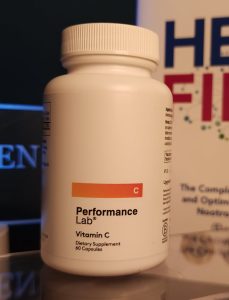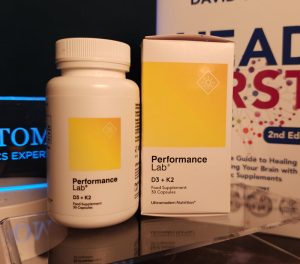Table of Contents
The best multivitamin on the planet and the one I use and recommend is here: Performance Lab NutriGenesis® Multi for men or women. Vitamins good for the brain.
Have you ever tried a nootropic supplement and been disappointed with the result?
The latest racetam or herbal supplement was supposed to provide better focus and memory. But it was a dud.
At first there is the temptation to blame the supplier for a bad product. Or you may think that nootropic just wasn’t for you.
But chances are the product was pure. And under different circumstances may have worked very well for the benefit you were looking for.
The problem is often a lack of support by simple vitamins and minerals our bodies need every day. Nutrients that are fundamental to our health and how our brain works.
For example, a recommended stack suggests using CDP-Choline or Alpha GPC to provide the acetylcholine your brain needs for a racetam like Aniracetam to work.
But acetylcholine requires Vitamin B1 (thiamine), and Vitamin B5 (pantothenic acid) for synthesis. And Vitamin C induces the release of acetylcholine from synaptic vesicles on neurons. Which means Vitamin C is required for neuronal signaling transmission.
Aniracetam did not provide the promised benefit because your body did not have an adequate supply of Vitamin B1, B5 and Vitamin C.
Another example, you try tryptophan with the hope of increasing and getting the benefits of more serotonin. But you will not experience the benefit of this nootropic without adequate levels of Vitamin B6 (P-5-P) which is a cofactor and required for the synthesis of serotonin.
In this post we investigate the vitamins that are essential to a fully optimized brain. And why a quality multivitamin may be the key to getting better results from the nootropic supplements you use daily.
And because of the length of this post, you can find all about the minerals your brain needs for optimal function here – 13 Minerals Essential for the Optimized Brain
Here’s the multi I use every day and highly recommend: Performance Lab NutriGenesis® Multi for men or women. It contains all 13 vitamins covered in this post at dosages that your body and brain need every day.
What are vitamins?
Vitamins are a group of organic compounds essential for human life but are not synthesized in your body. So, you need to get adequate amounts of all 13 vitamins from your diet, or as a supplement.
We require four fat-soluble vitamins A, D, E and K. And nine water soluble vitamins which include Vitamin C, and the eight B-Vitamins; thiamine (B1), riboflavin (B2), niacin (B3), pantothenic acid (B5), pyridoxine (B6), biotin (B7), folate (B9) and cobalamin (B12).
Although most vitamins in your diet are derived from plants, you often get them from higher up the food chain including meat, dairy and eggs.
Why we need a daily multivitamin
The National Health and Nutrition Examination Survey (NHANES) 2001-2008 found over 40% of adults surveyed had inadequate intake of basic vitamins and minerals. A large portion of adults were deficient in Vitamin A, C, D, and E.[i]
But even the most dedicated biohacker would be hard pressed to get the vitamins and minerals needed from their diet. The problem starts with our food supply.
One study evaluated the changes in food composition for 43 garden crops in the USA from 1950 to 1999. The researchers found a drastic decline in the levels of vitamins and minerals we assume we would get from good quality food.[ii]
Our body and brain require replenishment of vitamins and minerals every single day. Especially the water-soluble vitamins that our bodies cannot store.
A perfect, brain-healthy diet demands we supplement with a high-quality multivitamin.
The remainder of this post investigates exactly what each vitamin does in our brain. And why your nootropic stack is not complete without a full compliment of these essential vitamins.
13 essential vitamins for optimal brain health
Vitamin A
Vitamin A is a fat-soluble vitamin and potent antioxidant. It comes in two forms; pre-formed Vitamin A (retinol, retinyl ester) which is found in meat, poultry, fish, and dairy products and is used directly by your body.
 Pro-formed Vitamin A (carotenoids, beta-carotene) is found in fruit and vegetables and must be converted in your body to retinol and retinoic acid before it can be used.
Pro-formed Vitamin A (carotenoids, beta-carotene) is found in fruit and vegetables and must be converted in your body to retinol and retinoic acid before it can be used.
In your brain, Vitamin A is involved in long-term potentiation which affects memory formation. And long-term depression which affects mood. Retinoic acid is involved in neurogenesis, neuroplasticity, cell differentiation, synaptic signaling[iii] and inhibits beta amyloid deposits.
Because Vitamin A is fat-soluble, your body can store excess amounts. And these levels can accumulate. Excess ‘pre-formed’ Vitamin A can be toxic. But excess ‘pro-formed’ Vitamin A (i.e. beta-carotene) does not seem to be a problem.
Too much Vitamin A can result in memory disruption and depression. Too little Vitamin A may result in dementia or Alzheimer’s disease.[iv]
Vitamin A deficiency is not much of a problem in our Western society because one sweet potato for example offers 28,058 IU’s of this vitamin. And ½ cup of raw carrots provides 9,189 IU’s.
Recommended daily dosage of Vitamin A are given in mcg of retinol activity equivalents (RAE). But every multivitamin I’ve come across lists Vitamin A in International Units (IU’s).
And it is close to impossible to translate RAE from IU’s because the translation depends on the source of Vitamin A (i.e. retinol vs beta-carotene).[v]
The bottom-line for Vitamin A – you absolutely require this vitamin for optimal brain health. But unless you do not eat meat, dairy, vegetables or fortified processed foods, it is highly unlikely you are deficient in Vitamin A.
But you have no reason to get stressed if your multivitamin contains 6,000 IU’s of beta-carotene.
Vitamin B1 (Thiamine)
Vitamin B1 (Thiamine) was the first B Vitamin to be discovered. Hence, its name Vitamin B1. You get thiamine from eating beef, brewer’s yeast, legumes (beans, lentils), milk, nuts, oats, oranges, pork, rice, seeds, wheat, whole-grain cereals, and yeast.
Thiamine is directly involved in the citric acid (KREB) cycle that provides adenosine triphosphate (ATP) energy for your mitochondria.
Thiamine also plays a role in maintaining optimal levels of the neurotransmitters glutamate, and gamma–aminobutyric acid (GABA). And contributes to the production of the enzyme pyruvate dehydrogenase (PDH) which is essential in making the neurotransmitter acetylcholine.
 Even “mild thiamine deficiency” can turn your world upside down. Thiamine supplementation boosts attention, energy, and motivation. And a reduction in brain fog along with increased mental clarity and less anxiety.
Even “mild thiamine deficiency” can turn your world upside down. Thiamine supplementation boosts attention, energy, and motivation. And a reduction in brain fog along with increased mental clarity and less anxiety.
Those dealing with fibromyalgia and nerve pain report a significant decrease in pain levels.
Most clinical studies use thiamine doses from 300 up to 1,800 mg per day. The bottom-line is thiamine dosing is completely up to you. No side effects are reported even at higher doses.
Recommended nootropic dosage of Vitamin B1 (thiamine) is 50 – 100 mg per day.
Or you can use Sulbutiamine, a fat-soluble synthetic version of thiamine which is much more bioavailable. Recommended dosage of Sulbutiamine is up to 1,500 mg per day.
Some pre-formulated nootropic stacks use Benfotiamine which is a fat-soluble synthetic S-acyl derivative of thiamine. It is much more bioavailable than the Thiamine HCI found in many lower quality B-Complex vitamin stacks.[vi] Dosage of Benfotiamine is up to 900 mg per day.
Vitamin B2 (Riboflavin)
Vitamin B2 (Riboflavin) – the two flavoprotein coenzymes from riboflavin, FMN (flavin mononucleotide) and FAD (flavin adenine dinucleotide) are essential to most enzyme processes in every one of your cells.[vii]
FAD is required to produce pyridoxic acid from Vitamin B6 (Pyridoxine) which is the form of B6 your body can use. And is required to convert Vitamin A (retinol) to retinoic acid that your body can use.
FAD is required to convert tryptophan to Vitamin B3 (niacin). FMN and FAD are also cofactors in the metabolism of fatty acids in brain cell membranes, the absorption and utilization of iron, and the regulation of thyroid hormones.
Riboflavin is an essential part of ATP production in mitochondria. And research has shown that migraines are at least in part caused by impaired mitochondrial function.
Riboflavin has been investigated as a potential treatment for migraines. In one study, migraine patients received 400 mg of Riboflavin per day for 3 months. The study found a reduction in headache frequency and duration while using this nootropic.[viii]
The best food sources of Riboflavin are meat, organ meat, cheese, eggs, green leafy vegetable, beans and some nuts and seeds.
Anti-psychotics, and anticholinergic medications interfere with the body’s ability to absorb Riboflavin or reduces its effectiveness. Tricyclic antidepressants reduce Riboflavin levels. And drugs used to treat certain cancers can interfere with how your body uses Riboflavin.
Vitamin B2 (Riboflavin) recommended dose for adults is 1.1 – 1.3 mg per day. It is usually included in multivitamins and B-Complex vitamins. And sold separately in 25, 50 and 100 mg tablets.
Riboflavin is generally considered safe, even at high doses. And does not seem to cause any serious side effects. Very high doses could cause itching, numbness, burning sensations, yellow or orange urine and sensitivity to light.
Vitamin B3 (Niacin)
Vitamin B3 (Niacin, nicotinic acid) is a precursor to the coenzymes nicotinamide adenine dinucleotide (NAD), and nicotinamide adenine dinucleotide phosphate (NADP).
NAD is needed to catabolize fats, carbohydrates, proteins and alcohol. And NAD is involved in cell signaling and DNA repair.
NAD also converts to NADH which is the primary carrier of electrons in the transfer of food from your diet into energy. This energy is stored as adenosine triphosphate (ATP).
ATP provides the fuel for mitochondria in each of your cells. Not enough NADH leads to ATP depletion, which can eventually lead to cell death.[ix]
Niacin boosts the production of Nitric Oxide (NO) which relaxes blood vessels in your brain increasing cerebral blood flow. And niacin acts as an antioxidant helping to eliminate free radicals that can damage brain cells.[x]
Niacin affects cognitive function by stimulating the production of dopamine, norepinephrine and serotonin.[xi] These neurotransmitters are involved in memory, learning, cognition, recall and mood.
Niacin increases Brain Derived Neurotrophic Factor (BDNF) and stimulates growth hormone.[xii]
Niacin naturally occurs in foods like eggs, fish, meat, milk, peanuts, mushrooms, green vegetables, and yeast.
Your body also naturally synthesizes niacin from the amino acid tryptophan you get from food. This synthesis requires Vitamin B6, Vitamin B2 (riboflavin) and an enzyme containing iron.
The recommended daily dose of niacin depends on what you are treating. Anywhere from 44 mg – 4 grams of niacin per day. See the full review of Vitamin D3 (Niacin) for complete dosage recommendations.
See the main niacin review for prevention of niacin flushing and preferred forms to use to prevent liver toxicity.
Vitamin B5 (Pantothenic Acid)
Vitamin B5 (Pantothenic Acid) is essential for the synthesis of acetylcholine (ACh). Adequate levels of ACh can boost focus, memory, learning, and reduce brain fog.
Vitamin B5 is at the heart of the KREBs cycle and electron transport chain which helps convert nutrients from food into energy which is used to make adenosine triphosphate (ATP). ATP is the fuel source within each of your cells. More energy increases mental clarity, alertness, memory and mood.
As a precursor in the biosynthesis of Coenzyme-A (CoA), it is involved in the synthesis of the neurotransmitters acetylcholine, epinephrine, and serotonin. Affecting alertness, cognition, memory and mood.
Pantothenic acid is often referred to as the “anti-stress vitamin”. Your adrenal glands use CoA (made partly from pantothenic acid) along with cholesterol and Vitamin C to manufacture cortisol and epinephrine. Vitamin B5 has a reputation for reducing stress, anxiety and depression.
Foods rich in pantothenic acid include animal organs (liver and kidney), fish, shellfish, milk products, eggs, avocados, legumes, mushrooms, and sweet potatoes. Avocados contain the highest amount of pantothenic acid among commonly consumed foods, with one avocado containing about 2 mg.
As a nootropic, Vitamin B5 is crucial for converting the choline in your nootropic stack into acetylcholine (ACh). Without adequate levels of B5 you will not experience the benefits of using precursors to ACh like Alpha GPC and CDP-Choline.
The recommended dosage of Vitamin B5 (Pantothenic Acid) is a one-to-two ratio with a choline supplement. For example, 250 mg of Vitamin B5 with 500 mg of CDP-Choline.
When choosing a Vitamin B5 supplement, your basic choice is between Pantethine or Pantothenic Acid. Pantethine is by far the more active choice when it comes to producing CoA. And for stacking with a choline supplement.
Recommended dosage of Vitamin B5 is up to 1,000 mg per day.
Vitamin B6 (Pyridoxine, P-5-P)
Vitamin B6 (Pyridoxine, P-5-P) is required coenzyme for the synthesis of dopamine, epinephrine, GABA, melatonin, norepinephrine, and serotonin.[xiii]
As a nootropic, Vitamin B6 is crucial for the synthesis of these neurotransmitters. Even mild deficiency results in down-regulation of GABA and serotonin synthesis.
Leading to poor sleep, behavior, cardiovascular function, and the loss of hypothalamus-pituitary control of hormone secretion.[xiv] And increased anxiety, depression, fatigue and pain.
Vitamin B6 has a direct effect on immune function and gene transcription and expression. And plays a role in brain glucose regulation.
Vitamin B6 is needed to regulate homocysteine. High homocysteine levels are linked to inflammation that can lead to blood vessel damage. And possible plaque buildup leading to heart attack or stroke.
Vitamin B6 concentrations in your brain are about 100-times higher than levels in your blood. B6 is critical to the highly optimized brain.
Foods rich in Vitamin B6 include bananas, beef, chickpeas, pistachios, pork, potatoes, and turkey. But the problem is some forms of Vitamin B6 from plants (pyridoxine glucoside) are not very bioavailable.
Recommended dosage of pyridoxal 5′-phosphate (P-5-P) form of Vitamin B6 is up to 100 mg per day. P-5-P is the only ‘active’ form of B6 available and preferred for nootropic usage.
Pyridoxine neuropathy (nerve damage) has been reported in doses of Vitamin B6 of 200 mg to 5 grams per day for extended periods. When dosing was stopped, symptoms usually disappeared.[xv]
Vitamin B7 (Biotin)
 Vitamin B7 (Biotin, vitamin H) is a coenzyme for carboxylases involved in the metabolism of fatty acids, amino acids and glucose.[xvi]
Vitamin B7 (Biotin, vitamin H) is a coenzyme for carboxylases involved in the metabolism of fatty acids, amino acids and glucose.[xvi]
Biotin influences the use of branched-chain amino acids (BCAAs) in the synthesis and release of serotonin from tryptophan, and tyrosine from phenylalanine.[xvii]
As a coenzyme, Biotin is required for the synthesis fatty acids for energy production in the brain.[xviii] Lack of adequate Biotin can result in fatigue.
Biotin is required for the formation of myelin which protects axons.[xix] Not enough Biotin can result in reduced brain cell signaling and symptoms such as seizures, lack of muscle coordination, learning disabilities, hallucinations, depression and fatigue.[xx]
Biotin is required for white blood cell development which is needed for a healthy immune system and to protect the brain and body from infections.[xxi]
And Biotin plays a critical role in chromosome structure by attaching to histones, the structure DNA wraps around. Some of the recent research shows how Biotin plays a role in gene expression within your brain cells.[xxii]
You body cannot synthesize Biotin, so you must get adequate amounts daily from your diet, intestinal bacteria or as a supplement.
Biotin is found in foods such as organ meats, egg yolks, some dairy products, and some fruits and vegetables.
We do not have a recommended daily dietary allowance for Biotin. So you see varying amounts in multivitamin and B-Complex formulas.
Biotin is non-toxic and safe to take in reasonable doses. But research has recently shown it wise to stop taking Biotin a few days before blood tests.
Because Biotin raises levels of the thyroid hormones T4 and T3 and elevates levels of anti-thyrotropin receptor antibodies. Mimicking Grave’s Disease (hyperthyroidism).
If you are using Biotin before having thyroid labs done, the lab results may falsely report you as having Grave’s Disease.[xxiii]
Vitamin B9 (Folate)
Vitamin B9 (Folate) functions as a coenzyme in single-carbon transfers in the synthesis of DNA and RNA. And converts homocysteine to methionine which is used in the synthesis of S-Adenosyl-methionine (SAMe).[xxiv]
As a nootropic, folate is also involved in gene expression, amino acid synthesis, myelin synthesis, and is required for the synthesis of the neurotransmitters dopamine, epinephrine, norepinephrine and serotonin.
Folate is used in red blood cell production, helps break down and use proteins, and just about every other process in your body.
Folate deficiency is found in at least a third of those suffering from depression. Folate touches nearly everything happening in your brain.
Green leafy vegetables, or ‘foliage’ are rich sources of folate. And how ‘folate’ got its name. You can also get folate from citrus fruit juice, legumes, fortified foods and liver.
Many neurohackers, including doctors and other health professionals confuse folate with folic acid. They are NOT the same.
For a detailed explanation of why folate vs folic acid is such a big deal, see my full review of Vitamin B9 (folate). It covers how your body uses both compounds. And what happens if you have problems with the MTHFR gene.
Folate is critically important for the fully optimized brain. And research shows that folate levels even in the “normal (RDA) range” may be inadequate for methyl donation and neurotransmitter synthesis.
Supplementing with folate or a multivitamin with adequate levels of folate may help alleviate depression, improve memory and ward off dementia.
Discard or avoid buying any supplement bottle containing folic acid. You need folate or methyl-folate which is the type of this vitamin your body will use.
Recommended dosage for Vitamin B9 (Folate) is 500 mcg.
Vitamin B12 (Cobalamin)
Vitamin B12 (Cobalamin) is essential for the synthesis of DNA, RNA and neurotransmitters, the maintenance of myelin sheaths protecting neurons, and red blood cell formation.
Vitamin B12 is a cofactor in the synthesis of neurotransmitters dopamine, GABA, norepinephrine, and serotonin. Affecting alertness, cognition, memory and mood.
And Vitamin B12 is needed to regulate homocysteine. High homocysteine levels are linked to inflammation that can lead to blood vessel damage. And possible plaque buildup leading to heart attack or stroke.
Foods rich in Vitamin B12 include fish, shellfish, meat (especially liver), poultry, eggs, milk and milk products. The two best sources by far of B12 are clams and liver.[xxv]
You cannot get adequate amounts of Vitamin B12 from plants. Vegetarians and vegans are especially in danger of B12 deficiency. Regardless of what food and supplement manufacturers say.
Plant foods contain analogs of B12 which are similar to, but not the same as, Vitamin B12. They bind to B12 receptors and block your intake of true B12.
Trying to get your Vitamin B12 from yeast products like Red Star Nutritional Yeast or Marmite is also problematic. These products do not naturally contain B12 but are fortified with it.
Typical recommended dosage for nootropic benefit and optimal brain health is 100 mcg or 0.1 mg of Vitamin B12 per day.
Neurohackers older than 40 and those who have a problem with Vitamin B12 absorption should use 100 – 400 mcg or 0.1-0.4 mg of B12 per day.
If you test Vitamin B12 deficient, recommended dosage is 2,000 mcg daily for a week, then 1,000 mcg doses of B12 once per week for a month. Thereafter, your maintenance dose is 1,000 mcg monthly.[xxvi]
Avoid low quality Vitamin B12 supplements, and B12 found in multivitamins or B-Complex formulas, which is called cyanocobalamin. This form of B12 is not well absorbed and produces a small amount of cyanide in your body (cyanocobalamin).
Higher quality Vitamin B12 comes as methylcobalamin or adenosylcobalamin which are the forms of B12 naturally occurring in your body.
For the B-Vitamins – How Much Is Enough?
The B-vitamins are water-soluble. And any excess you take as a supplement will generally be excreted in your urine.
This means the B-vitamins are safer to take at much higher doses than RDA. But it also means you need to take them every day.
But this advice comes with a caveat …
 The upper limit of Vitamin B9 as folic acid is 1000 µg/day because higher doses of this vitamin can mask symptoms of Vitamin B12 deficiency.
The upper limit of Vitamin B9 as folic acid is 1000 µg/day because higher doses of this vitamin can mask symptoms of Vitamin B12 deficiency.
You shouldn’t be using folic acid in the first place. But even excess levels of folate can mask a Vitamin B12 deficiency.
The upper limit of Vitamin B3 (niacin) is set at 35 mg in the USA and Canada. Primarily because doses higher than 35 mg can cause flushing. You will not encounter flushing if you use Inositol hexanicotinate (IH) which is an “extended-release niacin” sold as “Flush Free Niacin”.
And doses of regular niacin (nicotinic acid) above 1,500 mg per day can be toxic to your liver.
The upper limit of Vitamin B6 (Pyridoxine) is 100 mg per day because higher doses can cause nerve damage (pyridoxine neuropathy).[xxvii]
You can get all of the above B-Vitamins with one NutriCaps® capsule with : Performance Lab® (NutriGenesis®) B-Complex
Vitamin C
Vitamin C (L-ascorbic acid) is a water-soluble nutrient and electron donor critically important for the healthy brain. The active form of Vitamin C is L-ascorbic acid.
Your brain contains more Vitamin C than any other organ in your body. Lack of adequate Vitamin C results in cognitive impairment at any age.[xxviii]
Vitamin C is a powerful antioxidant, and reactive oxygen species (ROS) scavenger. And participates in the recycling of other brain antioxidants including Vitamin E.
Vitamin C induces the expression of brain-derived neurotrophic factor (BDNF).[xxix] It contributes to myelin formation and brain cell membrane assembly.[xxx]
Vitamin C is a cofactor in the synthesis of norepinephrine from dopamine. It induces the release of acetylcholine (ACh) and norepinephrine from synaptic vesicles on neurons which means Vitamin C is involved in neuronal signaling transmission.
Vitamin C is involved in presynaptic re-uptake of glutamate. And prevents potential neuron damage from excess glutamate at NMDA receptors.
 Vitamin C is well-known for its contribution to collagen formation. And is a primary component of the basal membrane in blood vessels contributing to cerebral circulation.
Vitamin C is well-known for its contribution to collagen formation. And is a primary component of the basal membrane in blood vessels contributing to cerebral circulation.
Supplementing with Vitamin C improves mood, lowers anxiety, reduces fatigue and helps combat depression.
Many biohackers take mega-doses of Vitamin C, but studies show increasing your daily dose from 200 mg to 2,500 mg increases blood levels of this vitamin only marginally.[xxxi]
And there is an ongoing debate on the best form of Vitamin C. When it comes to the bioavailability of synthetic vs. ‘natural’ sources of Vitamin C; several clinical trials have shown no difference between the two.[xxxii]
The liposomal form of Vitamin C has excellent bioavailability and you’ll get 250 mg in 2 NutriCaps® capsules with: Performance Lab® (NutriGenesis®) Vitamin C
Vitamin D3
Vitamin D3 (cholecalciferol or calciol) is the fat-soluble steroid hormone form of Vitamin D. The “sunshine vitamin” is considered essential. Your skin synthesizes Vitamin D3 from ultraviolet-B (UVB) sunlight.
Vitamin D3 as a nootropic supplement is critical for optimal cognitive health. It’s an integral part of neurotransmitter synthesis, gene expression, DNA maintenance and repair, and the forms of neuroplasticity needed for memory formation and retrieval.
Vitamin D3 with Omega-3’s is needed for serotonin synthesis, release and function. Regulating executive function, sensory gating, and social behavior.
And Vitamin D3 is involved in the synthesis of GABA, glutamate and glutamine, and dopamine in your brain.[xxxiii]
Vitamin D3 protects against DNA damage through prevention of telomere shortening and inhibition of telomerase activity. And prevents oxidative damage to DNA.
And Vitamin D3 is involved in neuromodulation, regulation of neurotrophic factors, neuroprotection, neuroplasticity, and brain development. All in areas of the brain associated with depression. Supplementation could be an important part of depression treatment.[xxxiv]
 Vitamin D is mostly made in your skin from sun exposure. Not primarily from food like most of our other vitamins.
Vitamin D is mostly made in your skin from sun exposure. Not primarily from food like most of our other vitamins.
You get some Vitamin D from foods like fatty fish (tuna, salmon, and mackerel), beef liver, cheese, egg yolks, and mushrooms. Some foods in the USA are fortified with Vitamin D. It’s added to breakfast cereals, soy beverages, yogurt and margarine. Check the nutrition fact panel on the food label.
The Institute of Medicine recommends 4,000 IU per day for Vitamin D3. Vitamin D is fat-soluble. So, make sure you take it with a meal containing healthy fats. Or a tablespoon of extra-virgin coconut or olive oil.
To achieve optimal blood levels and for specific dosage recommendations, see Vitamin D dosage notes here.
You’ll get the pure NutriGenesis® form of Vitamin D3 + K2 with: Performance Lab® (NutriGenesis®) D3 + K2
Vitamin E
Vitamin E includes a group of eight structurally-related, fat-soluble, chain-breaking antioxidants: four tocopherols and four tocotrienols: α (alpha), β (beta), γ (gamma) and δ (delta).
α-Tocopherol is the most abundant and bioavailable antioxidant form of vitamin E in human cells. And the form of Vitamin that has received the most research.[xxxv]
But recent research from Karolinska Institute of Stockholm shows that all forms of Vitamin E play a role in brain health. The meta-analysis found that cognitive impairment was lowest in those with the highest levels of tocopherols and tocotrienols.[xxxvi]
Another study funded by the National Institute of Health found that d-alpha tocotrienol is 1,000X more potent that d-alpha-tocopherol in protecting brain neurons.[xxxvii]
As a neurohacker, chances are high that you are deficient in Vitamin E. A study showed that Vitamin E supplementation has fallen from 44% in 2002 to about 20% in 2006. And over 90% of Americans are not consuming enough Vitamin E.[xxxviii]
Vitamin E protects cells from damage associated with oxidative stress caused by free radicals. And even the healthiest brain is highly susceptible to oxidative stress.
High blood levels of Vitamin E have repeatedly been associated with better cognitive performance. And research shows that high levels of a-tocopherol and Vitamin A are found in the blood of centenarians.
Another study of 15,000 women aged around 70 years who used Vitamin E and Vitamin C over the last 20 years had significantly better cognition than those who did not supplement with these vitamins. Taking either of these vitamins on their own showed little evidence of providing better cognition.[xxxix]
Vitamin E is fat-soluble and found in plants, some oils, fruits and wheat germ.
Choosing the right Vitamin E is crucial because using a supplement with only alpha-tocopherol interferes with the absorption of other forms of Vitamin E including the tocopherols and tocotrienol that are needed for cognitive health.[xl]
The vast majority of Vitamin E supplements are synthetic gamma-tocopherol or alpha-tocopherol which are not the type of these isomers found in food. And useless to your body and brain.
Vitamin E can be unsafe when taken in high doses (400 IU or more). Especially if you are dealing with heart disease or diabetes.
One serious side effect of Vitamin E is increased risk of bleeding, especially in the brain.
High levels of Vitamin E increase your risk for heart failure (in diabetics), worse bleeding disorders, increased chance of head, neck and prostate cancer, increased bleeding after surgery, and increased chance of death after a heart attack or stroke.
Your best bet is to consciously get all the isomers of Vitamin E in your diet. If you decide to supplement, recommended daily dose of Vitamin E is less than 400 IU per day.
And look for a Vitamin E supplement that is food-sourced with all 8 isomers if you can find it.
Vitamin K
Vitamin K is a fat-soluble vitamin which got its name from the German word ‘koagulation’. Because it plays a primary role in blood clot formation.[xli]
We have two forms of Vitamin K; K1 (phylloquinone) and K2 (menaquinones). The two main types of Vitamin K2 are MK-4 and MK-7.[xlii]
Vitamin K is essential for the synthesis of sphingolipids which contribute to the formation of the myelin sheath insulating axons in your brain. Sphingomyelin plays a significant role in cell signaling pathways.[xliii]
Several proteins in your brain are dependent on Vitamin K. For example, protein Gas6 is actively involved in apoptosis, mitogenesis, neuron and glial cell growth.
And the vitamer MK-4 plays a unique role in the fight against oxidative stress and inflammation.
Research into the implication of Vitamin K and brain health is ongoing. But so far it is clear that this vitamin is crucial for the optimized brain.
One recent study showed increased dietary intake of Vitamin K is associated with better memory. Particularly in older adults.[xliv]
You get Vitamin K2 primarily from meat like chicken, pork, beef, egg yolks, milk and cheese. K2 is higher in meat and dairy products from grass-fed animals. And you get Vitamin K1 from green leafy vegetables.
As a nootropic, find a supplement that includes Vitamin K1 and K2 (both MK-4 and MK-7). Natural health professionals recommend at least 2,000 mcg of K2 of which at least 100 mcg should be in the form of MK-7.
Recent research shows that all four fat-soluble Vitamins A, D, E and K work synergistically for optimal health and brain function.[xlv]
You’ll get the pure NutriGenesis® form of Vitamin D3 + K2 with: Performance Lab® (NutriGenesis®) D3 + K2
Choosing the Best Multivitamin for Brain Health
Most multivitamins contain vitamin and mineral dosages based on the government published ‘Recommended Daily Allowance’ (RDA).
In the USA, the most recent RDA recommendations were published in 1968. But there is an inherent weakness in the RDA. Because it’s like the ‘authorities’ attempting to create a shirt that would fit 95 out of 100 people.
And consider this …
The minimum RDA of each vitamin and mineral is what the ‘authorities’ considered in 1968 to be the minimum of each nutrient to sustain life. Not necessarily to make you feel great. Just to keep you alive.
For the dedicated biohacker working toward optimal health and cognition, we look at the clinical data and how we feel to determine what we need.
See my post “How to Select the Best Multivitamin for Brain Function” on what to look for when it comes to quality.
And here’s the multi I use every day and highly recommend: Performance Lab NutriGenesis® Multi for men or women. It contains all 13 vitamins we covered in this post at dosages that your body and brain need every day.
Use the recommended dosages in this post as a general guide when reading multivitamin labels.
Your body and brain require each of the above 13 vitamins daily for optimal health. Some you will get from a healthy diet; preferably with organic vegetables and fruit, and grass-fed meat products.
The remainder must be supplied by supplementing with the right multivitamin every day. You’ll feel better and your nootropic stack has a more likely chance of providing the benefits you were looking for.









Join The Discussion - 83 comments
salem
March 1, 2024
hi david
i took vitamin B2 Riboflavin 100mg from NOW brand… and it gave me a diarrhea !
whats does that mean ?
David Tomen
March 1, 2024
Salem, likely means it’s too high of a dose for you.
salem
February 12, 2024
hi David
regarding vitamin E,
Is d-alpha tocopheryl succinate better than acetate ? or its the same effect ?
David Tomen
February 12, 2024
Salem, both of them are bad because a supplement with only alpha-tocopherol interferes with the absorption of other forms of Vitamin E including the tocopherols and tocotrienol that are needed for cognitive health
salem
February 12, 2024
am taking a supplement that contains multiple vitamins,
it includes Vitamin E (40 IU as d-Alpha Tocopheryl Acid Succinate ) 27 mg
is that a small amount? i hope it will not effect me in bad way, cuz i will only use for couple month ?
David Tomen
February 13, 2024
Salem, check the rest of the contents of that multivitamin because chances are the rest of it is synthetic too. If that’s the case then you may as well not use it because your system cannot use synthetic forms of vitamins.
salem
February 14, 2024
hi David,
if my body cannot use synthetic forms of vitamins, will it hurt my body ?
or my body will just get rid of it ?
and i checked the rest contents, gladly all of them are bioavailable , only that form of vitamin E is synthetic
David Tomen
February 14, 2024
It won’t “hurt” your body directly because they are synthetic. But you will not get the benefit of that nutrient if it is synthetic. Your body will simply excrete it.
The only problem is that Vitamin E because using it prevents the other Vitamin E from working and providing their benefit.
Max
February 7, 2023
Vitamin C, A, B3 deficiency can cause cancer and brain cancer. This is the most likely reason. Genetic factor is not related to cancer at all. Blood tests are ineffective. They show only the concentration of some vitamin in the blood at the current moment, but we need to know the amount that has been successfully absorbed by the cells.
Tom
December 10, 2022
David, I have adhd and – in addition to the rest of my stack and meds -am having excellent results with B vitamins (1,5,6) especially pantothenic acid. I’m just starting with 3 and 9. (b12 seems to make me feel worse).
I’m not taking the b vitamins at the weekend as the b1 – double wood Sulbutiamine – says tolerance can develop. I’m worried this may apply for other b vitamins but I just can’t find anything on this on the Internet. Is this an issue as I’d love to take the b vitamins at the weekends. They give me a huge boost.
Thank you for your invaluable work.
David Tomen
December 10, 2022
Tom, the B-Vitamins are water soluble and any unused vitamin comes out in your urine. You body and brain have constant need for each of the B-Vitamins. So you cannot grow “tolerant” to them.
Tom
December 17, 2022
Thanks David. I suppose my concern is becoming tolerant to the beneficial effects of the high doses of b vitamins which – as I understand it – are well above the range of RDA/normal human consumption, and in some cases in a form that has been specially developed by the manufacturer. Is the answer the same? Ie that there is no risk of tolerance from the beneficial effects of vitamins in the form and dosage that you suggest?
David Tomen
December 21, 2022
Tom, again you cannot become tolerant to the beneficial effects of the B-Vitamins. If you did you would become dead. But like any nootropic supplement, it is not a good idea to use anything more than the recommended adult dosage. Many times going over the highest adult dosage has in inverse effect.
Max
October 29, 2022
I tested some multivitamins and confirm that multivitamins in large dosages make the brain work in a completely different way. It seems that people are zombified and repressed by chieftains, in those countries where there are no vitamins with large dosages. I am very grateful to David. He brings the truth through this great website.
Jim
August 13, 2022
Hello David, do you think that the amount of calcium in Performance Lab NutriGenesis® Multi is enough to avoid bone problems in healthy people? I am 30 years old and I want to know if apart from Permance Lab you recommend me to consume a calcium supplement
And one last question, according to your experience a man with normal Testosterone values should undergo an estradiol test as well?
David Tomen
August 14, 2022
Jim, for calcium it depends. Probably not if you are healthy and are not dealing with bone problems. I fractured my calcaneal in March and used this calcium supplement: https://geni.us/8HGOMr (Amazon). The X-Rays show it healed perfectly.
And I do suggest getting a full testosterone panel done. Which should include estradiol and SHBG. If either of those is too high not enough of the testosterone you do have will get into cells that need it.
Jatin
August 12, 2022
Hi Sir,
How much vitamin C is required per day if one is not deficient in it?
David Tomen
August 14, 2022
Studies show your body will only use around 200 mg Vitamin C at a time. So, Vitamin C 200 mg twice per day should be sufficient.
Stacy Malfov
June 13, 2022
Valuable information! Thank you!
Interesting fact:
Vitamin D3 is one of the vitamins that can be taken rarely but in large doses instead of daily use. For example, I have Wellabs Vitamin D3 at a dosage of 10000 IU, and I drink it every 5-7 days. It’s making my life easier.
David Tomen
June 13, 2022
Stacy, it’s because it is fat-soluble and the unused portion is stored in fat cells until your system needs it. But I suggest you also get your Vitamin D labs done to make sure you are using the right dose.